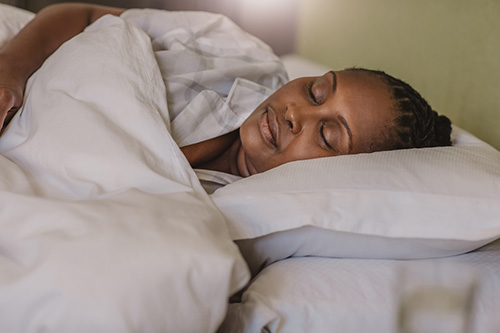Common hormonal causes of insomnia or sleeping problems
“If I’m so tired, why can’t I sleep?” How to find natural relief for insomnia:
Few symptoms are quite as disruptive as insomnia because it affects both physical health and mental health so dramatically. Your body is struggling to function, and it’s hard to stay sharp and focused when you’re perpetually overtired. Lack of sleep also jangles your emotions and can leave you feeling not at all like yourself.
“As I got older the insomnia really kicked in. I’ve been on the Program for about half a year now, and it has helped a whole lot with my sleep problems. People have definitely noticed the change in me. I’m bright-eyed and bushy-tailed.”
Chris, customer

Your brain maintains a “circadian clock” which regulates levels of adrenal hormones like adrenaline and cortisol, and controls patterns in body temperature, brainwave activity, and hormone production. This internal timekeeper is connected to changes in daylight, darkness, and the seasons, and resets itself according to shifts in the earth’s rotation.
Normally, these circadian rhythms and your adrenal glands work together to keep cortisol — a “wake-up” hormone — low at bedtime, so you can sleep. Cortisol should rise to its daily high when it’s time for you to wake up. But this internal clock can be easily upset by ongoing stress of almost any kind. Long-term stress can lead to adrenal imbalance suppressing the body’s natural sleep–wake rhythm.
Especially detrimental to your sleep cycle is “perceived” stress — perhaps, a problem at work or a difficult personal relationship. These sorts of issues aren’t life-threatening emergencies, but your body can’t tell the difference. It operates in survival mode, keeping you on alert, prepared — and wide awake.
Which profile best describes your experience with insomnia as a symptom?
- Insomnia and adrenal imbalance. You may feel both “tired and wired,” which can be directly related to adrenal imbalance. Even though you feel exhausted, you still can’t fall asleep easily. Or you may drop off initially, only to wake a short time later, fully aware and ready to go. You may have low energy in the afternoon, but get a second wind right before bedtime. You may feel the need to use caffeine and/or sugary foods to boost your energy level.
- Insomnia and hormonal imbalance. If you’re in perimenopause, menopause, or have PMS, you may have restless sleep. Night sweats may wake you up and interrupt your normal sleep cycle, so it’s hard to fall back asleep. If you have other symptoms of hormonal imbalance (mood swings, irritability, or uncomfortable physical changes) your insomnia may be related to hormonal fluctuation.
Discovering natural relief for your insomnia
Despite what the ads say, prescription sleep aids are not a solution to insomnia. They often have after-effects, and can be highly habit-forming. Your first step is to demystify your insomnia and determine what’s causing it. For women who are under stress, simply providing adrenal support and making a few lifestyle adjustments can break the cycle of adrenal imbalance and relieve symptoms like insomnia.
Practicing good “sleep hygiene” can help you get the rest you need each night. For more solid, restorative sleep, turn off your television and computer well before bedtime. Keep your bedroom cool and dark, and go to bed at a reasonable hour. Avoid alcohol, caffeine, and big meals or snacks in the hours before bedtime.
What you can do today
Find an evening wind-down routine that works for you — dim the lights, take a warm bath or shower, have a gentle pre-bed yoga stretch. Read or write in a journal — a daily entry in a “gratitude diary” invites peaceful sleep.
Why it works
Any sort of consistent ritual before bed tells your body that it’s time to wind down and settle in for a restful night’s sleep.
For insomnia — our Adrenal Health Protocol
In our experience, insomnia in women is very often a symptom of adrenal imbalance. The Adrenal Health Protocol helps relieve symptoms and promotes natural adrenal balance with advanced nutritional supplements, our exclusive adrenal support formulas, and practical dietary and lifestyle guidance.
- If you’re ready for relief, order now with our risk-free trial.
- To learn more, go to How the Adrenal Health Protocol works.
- To assess your symptoms, take our on-line Adrenal Health Profile.
If you have questions and want to talk to a real woman, call us toll-free at 1-800-448-4919. We’re here to listen and help.









